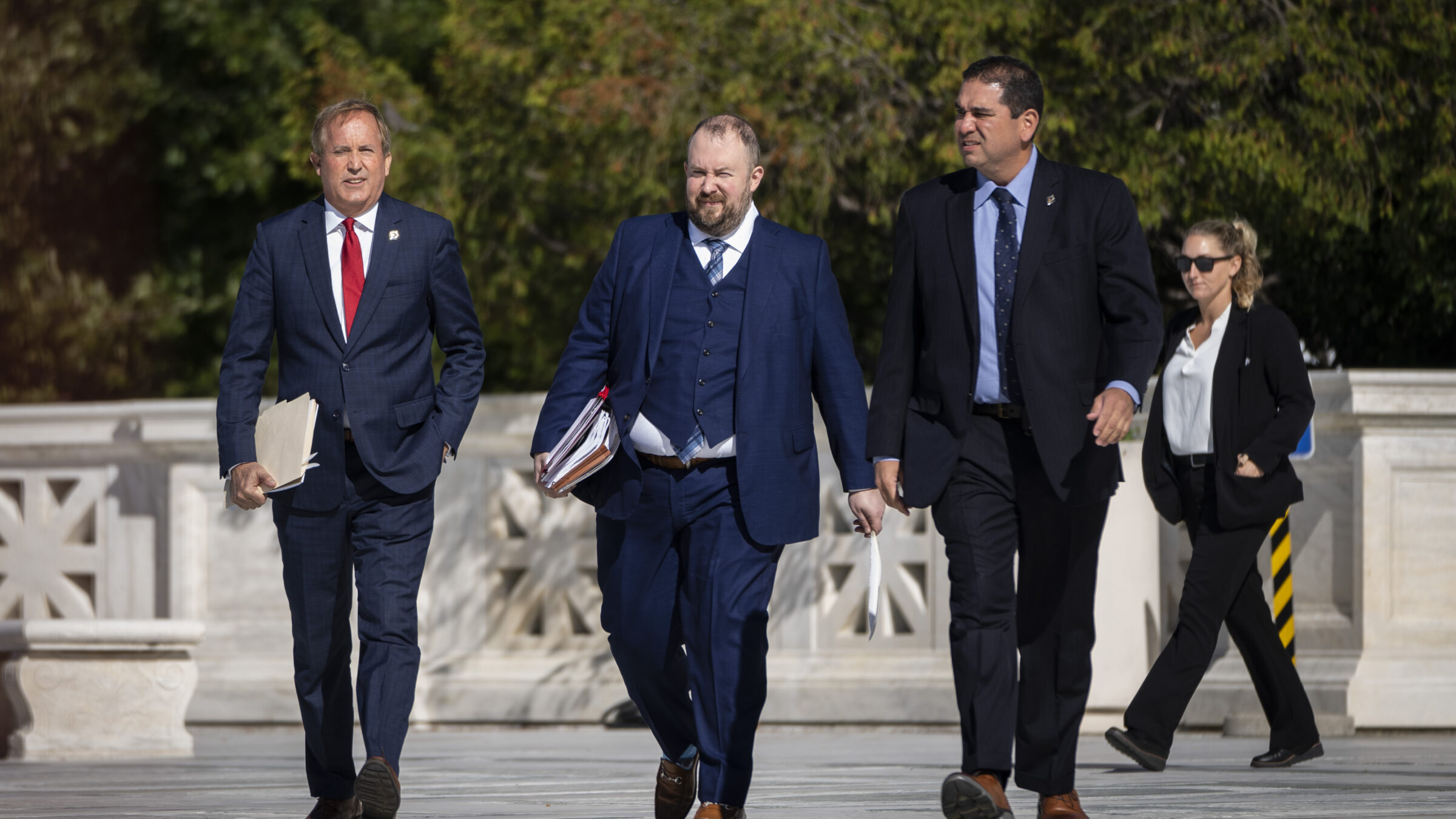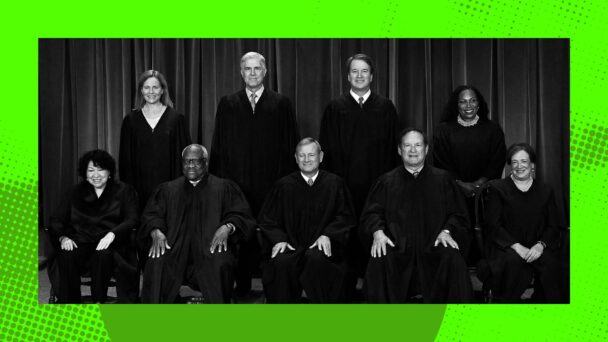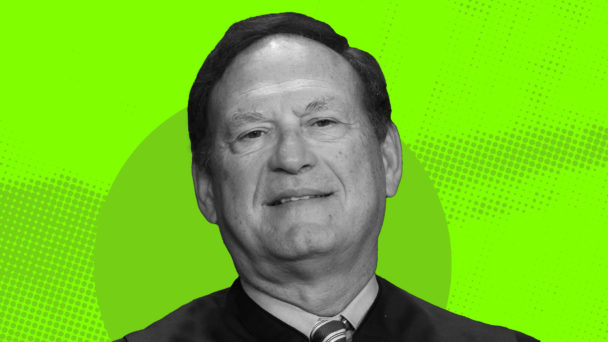Even if you don’t immediately recognize Jonathan Mitchell’s name, you’re probably familiar with his handiwork. Mitchell is the Texas lawyer who invented the dystopian enforcement mechanism for SB8, Texas’s six-week abortion ban, which allows private citizens to sue anyone who “aids or abets” an abortion—and, if they win, to pocket $10,000 for their efforts. This structure was an attempt to skirt Roe v. Wade, then still in effect, by relieving government officials of enforcement responsibility, thus making legal challenges procedurally difficult. When the Supreme Court upheld SB8, it was a preview of what came a few months later: a Court comfortable with overturning Roe at last.
But Mitchell is much more than the man who helped make it legal for anti-choicers to moonlight as bounty hunters. In the aftermath of Roe’s demise, Mitchell has been working to roll back same-sex marriage rights, gut the Affordable Care Act, and ban books that cover race, LGBTQ issues, or whatever else Tucker Carlson happens to be upset about at that particular moment. If a culture war is going on, Mitchell is in the thick of it, representing people who used to be relegated to the legal fringes, but are now engaged in a concerted effort to move the law much further to the right.
Mitchell’s résumé is a laundry list of fancy conservative legal jobs: After law school, he started off his career clerking for two conservative judges—federal appeals court judge J. Michael Luttig, and the late Justice Antonin Scalia. He then did a three-year stint in the Office of Legal Counsel under President George W. Bush. Between government jobs, he taught at two conservative law schools, the University of Chicago and the Antonin Scalia Law School.
Much like another notably terrible Texas attorney, Ted Cruz, Mitchell’s career took off in earnest in 2010, when he became Solicitor General of Texas. In that role, Mitchell racked up cool wins on the state’s behalf, like blocking Planned Parenthood from a key source of funding for treating low-income patients. He also defended HB2, a Texas law that created onerous restrictions on abortion care; that case, Whole Women’s Health v. Hellerstedt, eventually made it to the Supreme Court, which overturned the law in 2016, when Roe was still in effect.
Clip via YouTube
In 2018, after a brief stint at the conservative Hoover Institute, Mitchell started his own firm, Mitchell Law. Most of the firm’s web presence consists of a line on his LinkedIn profile, but Mitchell doesn’t need to advertise too much, because the types of people who want to hire Mitchell already know how to find him. And the throughline of his work is staying two steps to the right of whatever conservative courts are doing already. For example, a Texas anti-choice organization drafted him to author an amicus brief in Dobbs v. Jackson Women’s Health Organization that called on the Court to invalidate “the court-invented rights to homosexual behavior and same-sex marriage,” which, Mitchell argued, is “as lawless as Roe.” Mitchell is also involved in Braidwood v. Becerra, a challenge to the Affordable Care Act in which a Trump judge, Reed O’Connor, invalidated many of the law’s preventative care requirements. (No longer will America suffer the moral hazard of providing people with free cancer screenings!) Although this was a big win for conservatives, Mitchell’s clients want even more, and are cross-appealing in an attempt to narrow access to contraceptive care and vaccines, too.
The rest of Mitchell’s caseload reads like a list of grievances read aloud at CPAC. He represents Dianne Hensley, a Texas justice of the peace who doesn’t want to perform same-sex marriages because her cramped version of Christianity forbids it. He represents George Stewart, who is suing over his rejection by medical schools in Texas, arguing he was passed over for less qualified Black candidates. If this sounds familiar, that’s because the Supreme Court is considering two cases right now that are likely to result in the end of race-conscious admissions to colleges and universities. Mitchell’s case could be part of a belt-and-suspenders approach in case the Court doesn’t come down the way he wants, and/or an insurance policy in case the Court doesn’t deal with admissions to postgraduate institutions in those opinions. Regardless, it’s another hot-button political issue in which Mitchell is on precisely the side you’d guess.

Texas Attorney General Ken Paxton and Texas Solicitor General Judd Stone exit the Supreme Court on November 1, 2021 after defending the Texas abortion law that Mitchell crafted (Photo by Drew Angerer/Getty Images)
Speaking of which: Mitchell represents Llano County, Texas, which was recently sued after it removed 17 books, several of which deal with race and LGBTQ issues, from its public library system. Mitchell claimed the books were removed as part of the process of “weeding,” in which libraries pull books that are not being checked out—an argument tough to square with the county commissioners’ choice to eliminate the library board and replace it with an “advisory board” that includes some of the people who complained about the books in the first place. One new board member had urged “all the pastors” to get involved in the controversy: “Perhaps they can organize a weekly prayer vigil on this specific issue,” she wrote. “May God protect our children from this FILTH.”
The culture war business is so good for Mitchell that he allegedly can’t fit much more of it into his week. Recently, he asked for additional time to file in the Llano County case because of his “exceptionally busy schedule.” In reality, as Law Dork’s Chris Geidner noted, he was pressed for time because he had just jumped into another case, an effort in New Mexico to make it harder for lawmakers to preserve access to abortion.
Had Trump not stuffed the judiciary full of conservative goons, Mitchell would be a mostly-harmless crank whose tireless enthusiasm for rolling back the rights of others would find no foothold in a legal system that wasn’t defined by reactionary grievance. But conservative dominance of the courts has created an opportunity for people like Mitchell, who is one of many conservative lawyers and law firms eager to make aggressive arguments before receptive audiences. Right now, Mitchell is at the top of his game—the smart choice for all the wrong people.




